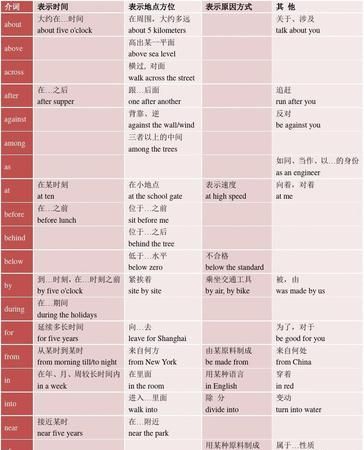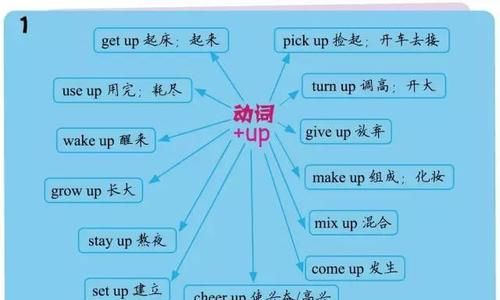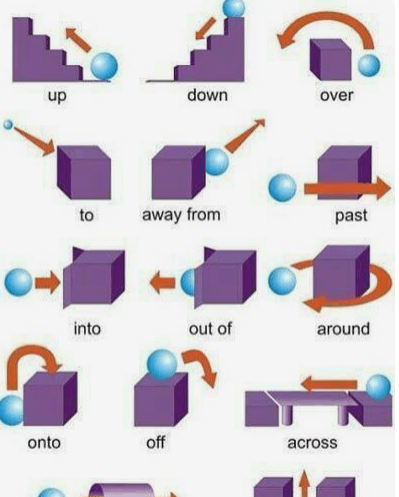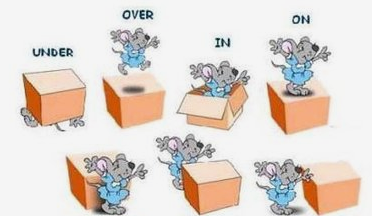本文目录
中考介词和介词短语专题
初中英语常用介词短语 1)at once 立刻 2)at last 最后 3)at first 起先,首先 4)at the age of… 在……岁时 5)at the end of… 在……之末 6)at the beginning of… 在……之初 7)at the foot of… 在……脚下 8)at the same time 同时 9)at night/noon 在夜里/中午 10)with one's help 在某人的帮助下,由于某人的帮助 11)with the help of …在……的帮助下 12)with a smile 面带笑容 13)with one's own eyes 亲眼看见 14)after a while 过了一会儿 15)from now on 从现在起 16)from then on 从那时起 17)far example 例如 18)far away from 远离 19)from morning till night 从早到晚 20)by and by 不久 21)by air mail 寄航空邮件 22)by bike/air/train/bus 骑自行车/乘飞机/火车/汽车 23)by ordinary mail 寄平信 24)by the way 顺便说 25)by the window 在窗边 26)by the end of… 到……底为止 27)little by little 逐渐地 28)in all 总共 29)in fact 事实上 30)in one's twenties 在某人二十几岁时 31)in a hurry 匆忙 32)in the middle of 在……中间 33)in no time (in a minute) 立刻,很快 34)in time (on time) 及时 35)in public 公众,公开地 36)in order to 为了…… 37)in front of 在……前面 38)in the sun 在阳光下 39)in the end 最后,终于 40)in surprise 惊奇地 41)in turn 依次 42)of course 当然 43)a bit (of) 有一点儿 44)a lot of 许多 45)a little 一点儿 46)on one's way to 某人在去……的路上 47)on foot 步行,走路 48)a talk on space 一个关于太空的报告 49)on the other hand 另一方面 50)at/on the weekend 在周末 51)on the left (right) 在左(右)边 52)on the other side of 在……另一边 53)on the radio 通过收音机(无线电广播) 54)to one's joy 使……高兴的是 55)to one's surprise 使……惊讶的是 栏目树形导航 | 首页 | 文章中心 | 教学课件下载 | 图片中心 | 常用网站链接 | 雁过留声 | 论坛发帖 | | 文章中心首页 | 课程教材教法 | 语言文化 | 新目标英语专栏 | 试题交流 | 媒体制作 | 师生学习园地 | 吉的堡英语 | 新闻通知 | 您现在的位置: 英语教育先锋网 >> 文章中心 >> 试题交流 >> 初中试题交流 >> 正文 用户登录 新用户注册 初中英语常用动词词组及短语240个 热 【字体:小大】 初中英语常用动词词组及短语240个 由be构成的词组 1)be back/in/out 回来/在家/外出 2)be at home/work 在家/上班 3)be good at 善于,擅长于 4)be careful of 当心,注意,仔细 5)be covered with 被……复盖 6)be ready for 为……作好准备 7)be surprised (at) 对……感到惊讶 8)be interested in 对……感到举 9)be born 出生 10)be on 在进行,在上演, (灯)亮着 11)be able to do sth. 能够做…… 12)be afraid of (to do sth. that…) 害怕……(不敢做……,恐怕……) 13)be angry with sb. 生(某人)的气 14)be pleased (with) 对……感到高兴(满意) 15)be famous for 以……而著名 16)be strict in (with) (对工作、对人)严格要求 17)be from 来自……,什么地方人 18)be hungry/thirsty/tired 饿了/渴了/累了 19)be worried 担忧 20)be (well) worth doing (非常)值得做…… 21)be covered with 被……所覆盖…… 22)be in (great) need of (很)需要 23)be in trouble 处于困境中 24)be glad to do sth. 很高兴做…… 25)be late for ……迟到 26)be made of (from) 由……制成 27)be satisfied with 对……感到满意 28)be free 空闲的,有空 29)be (ill) in bed 卧病在床 30)be busy doing (with) 忙于做……(忙于……) 由come、do、get、give、go、have、help、keep、make、looke、put、set、send、take、turn、play等动词构成的词组 31)come back 回来 32)come down 下来 33)come in 进入,进来 34)come on 快,走吧,跟我来 35)come out出来 36)come out of 从……出来 37)come up 上来 38)come from 来自…… 39)do one's lessons/homework 做功课/回家作业 40)do more speaking/reading 多做口头练习/朗读 41)do one's best 尽力 42)do some shopping (cooking reading, cleaning)买东西(做饭菜,读点书,大扫除) 43)do a good deed (good deeds)做一件好事(做好事) 44)do morning exercises 做早操 45)do eye exercises 做眼保健操 46)do well in 在……某方面干得好 47)get up 起床 48)get everything ready 把一切都准备好 49)get ready for (=be ready for) 为……作好准备 50)get on (well) with 与……相处(融洽) 51)get back 返回 52)get rid of 除掉,去除 53)get in 进入,收集 54)get on/off 上/下车 55)get to 到达 56)get there 到达那里 57)give sb. a call 给……打电话 58)give a talk 作报告 59)give a lecture (a piano concert)作讲座(举行钢琴音乐会) 60)give back 归还,送回 61)give……some advice on 给……一些忠告 62)give lessons to 给……上课 63)give in 屈服 64)give up 放弃 65)give sb. a chance 给……一次机会 66)give a message to……给……一个口信 67)go ahead 先走,向前走,去吧,干吧 68)go to the cinema 看电影 69)go go bed 睡觉(make the bed 整理床铺) 70)go to school (college) 上学(上大学) 71)go to (the) hospital 去医院看病 72)go over 过一遍,复习/ go over to 朝……走去 73)go fishing/skating/swimming/shopping 去钩鱼/滑冰/游泳/买东西 74)go home (there) 回家去(去那儿) 75)go round 顺便去,绕道走 76)go up 上去 77)go out for a walk 外出散步 78)go on (doing) 继续(做……) 79)go shopping 去购物 80)go on with one's work 继续某人的工作 81)go upstairs/downstairs 上/下楼 82)(the lights) go out (灯)熄了 83)have a lesson (lessons)/a meeting 上课/开会 84)have a football match (basketball match) 举行一场足球(蓝球)赛 85)have dictation 听见 86)have a try 试一试 87)have a good/wonderful time 玩得很高兴 88)have a lecture (a piano concert) 听讲座(听钢琴音乐会) 89)have a report (talk) on 听一个关于……的报告 90)have a glass of water (a cup of tea) 喝一杯水,(一杯茶) 91)have breakfast/lunch/supper /dinner吃早饭/午饭/晚饭 92)have a meal (three meals) 吃一顿饭(三餐饭) 93)have bread and milk for breakfast 早饭吃面包和牛奶 94)have (have got) a headache 头痛 95)have a fever 发烧 96)have a cough (a cold) 咳嗽(感冒) 97)have a look (at) 看一看…… 98)have a rest (a break) 休息一会儿(工间或课间休息) 99)have a talk 谈话 100)have a swim/walk 游泳/散步 101)have sports 进行体育锻炼 102)have a sports meet (meeting) 开运动会 103)have something done 让人(请人)做…… 104)have a test/an exam 测验/考试 105)have an idea 有了个主意 106)had better do sth. (not do sth.) 最好做……(最好不要做……) 107)have a word with 与……谈几句话 108)help sb. with sth. 在……方面帮助…… 109)help sb. (to) do sth. 帮助……做…… 110)help oneself to some chicken/fish/meat 请随便吃点鸡/鱼/肉 111)help each other 互相帮助 112)have nothing to do 无事可做 113)keep up with 跟上……,不落后于…… 114)keep silent/quiet 保持沉默/安静 115)keep sb. doing sth. 使……一直做…… 116)keep one's diary 记日记 117)make a noise (a lot of noise, much noise, noises)吵闹(十分嘈杂,响声) 118)make a living 谋生 119)make sb. do sth. 迫使某人做…… 120)make faces (a face)做鬼脸 121)make friends (with)与……交朋友 122)make a mistake (mistakes)犯错误 123)make room/space for 给……腾出地方 124)make a sentence (sentences)with 用……造句 125)make a fire 生火 126)be made from/of 由……制成 127)be made in 在……地方制造 128)look out of (outside) 往外看(看外面) 129)look up a word (in the dictionary) 查字典 130)look up 往上看,仰望 131)look after 照管,照看,照顾 132)look for 寻找 133)look like 看上去像 134)look fine/well/tired/worried 看起来气色好/健康/疲劳/忧虑 135)look out 当心,小心 136)look on …as… 把……当作……看待 137)look around 朝四周看 138)look at 看着…… 139)put on 穿上(衣服),戴上(帽子),上演(戏剧) 140)put up 建造,搭起,挂起,举起,张帖 141)put into 使进入,输入 142)put one's heart into 全神贯注于 143)put…down… 把……放下 144)put…into… 把……译成 145)set up 竖起,建起 146)set off 出发,动身 147)set out 出发 148)set an example for 为……树立榜样 149)send for 派人去请(叫) 150)send out 放出,发出 151)end up 把……往上送,发射 152)take one's advice 听从某人劝告 153)take out 拿出,取出 154)take down 拿下 155)take place 发生 156)take one's place 坐……的座位,代替某人职务 157)take the place of 代替…… 158)take a walk/rest 散步/休息 159)take it easy 别紧张 160)take sth.with sb. 随身带着 161)take sb. to a park/London for one's holidays 带某人去公园/伦敦度假 162)take care of 关心,照顾,保管 163)take a look (a last look) at 看一看(最后看一眼) 164)take an exam 参加考试 165)take away 拿走 166)take back 收回,带回 167)take hold of 抓住…… 168)take off 脱下(衣,帽,鞋等)拿掉 169)take (an active) part in (积极)参加(活动) 170)take photos 拍照 171)take some medicine 服药 172)take a bus/train, boat/ 乘公共汽车,火车/船 173)turn on 开,旋开(电灯,收音机等) 174)turn off 关上(电灯,收音机等) 175)turn in 交出,上交 176)turn…into… 变成 177)turn to 翻到,转向 178)turn down (把音量)调低 179)turn…over 把……翻过来 180)play basketball 打篮球,football 踢足球,volleyball 打排球 181)play games 做游戏 182)play the piano (the violin) 弹钢琴(拉小提琴) 183)play with snow 玩雪 184)play a joke (on) 对……开玩笑 由其他动词构成的词组 185)think over 仔细考虑 186)arrive at/in a place 到达某处 187)eat up 吃完,吃光 188)do well in 在……干得好 189)enjoy doing sth. like doing sth. 喜欢做某事 喜欢干某事 190)find out 发现,查出(真相等) 191)finish off 吃完,喝完 192)stop doing sth. 停止做某事 193)stop to do sth. 停下来去做某事 194)hold a meting 举行会议 195)hold up 举起 196)hurry up 赶快,快点 197)enter for 报名参加 198)langht at 嘲笑 199)be used to 习惯于 200)used to 过去常常 201)wake…up 唤醒 202)work out 算出 动词短语 203)ask for 向……要……,请求 204)ask for leave 请假 205)send for 派人去请(叫) 206)pay for 付……的款 207)wait for 等候 208)thank for 为……感谢 209)apologize to sb. for sth. 为某事向某人道歉 210)look for 寻找 211)leave…for 离开……去…… 212)fall off 跌落 213)catch cold 着凉,伤风 214)catch up with 赶上 215)agree with sb. 赞成,同意某人的意见 216)filled……with 把……装满 217)tell sb. about sth. 告诉某人某事 218)talk about 谈论…… 219)think about 考虑…… 220)worry about 担忧…… 221)look after 照料 222)run after 追赶,跟在后面跑 223)read after 跟……读 224)smile at 对……微笑 225)knock at 敲(门、窗) 226)shout at 对……大喊(嚷) 227)throw away 扔掉 228)work hard at 努力做…… 229)wait in line 排队等候 230)change…into… 变成 231)hurry into… 匆忙进入 232)hurry up 快点 233)run into… 跑进 234)hear of 听说 235)hear from 收到……来信 236)think of 认为,考虑 237)catch hold of 抓住 238)instead of 代替…… 239)hand in 交上来 240)stay in bed 卧病在床

中考英语介词考点归纳
I. 介词的.概念
介词是一种用来表示词与词, 词与句之间的关系的词。在句中不能单独作句子成分。介词后面一般有名词代词或相当于名词的其他词类,短语或从句作它的宾语。介词和它的宾语构成介词词组,在句中作状语,表语,补语或介词宾语。
II. 牢记口诀
介词口诀:自从以当为按照,由于对于为了到;和跟把比在关于,除了同对向往朝;用在名词代词前,修饰动形要记牢。
III. 介词归类大全
(1)at ,in, on, to
at (1)表示在小地方; (2)表示在附近,旁边
in (1)表示在大地方; (2)表示在范围之内。
on 表示毗邻,接壤
to 表示在范围外,不强调是否接壤
例句:He arrived at the station at ten.
He is sitting at the desk.
He arrived in Shanghai yesterday.
Jiangsu lies in the east of China.
Russia lies on the north of China.
Fujian is to the south of Jiangsu Province.
(2)above, over, on 在上
above 指在上方,不强调是否垂直,与 below相对;
over指垂直的上方,与under相对,但over与物体有一定的空间,不直接接触。
on表示某物体上面并与之接触。

初中英语介词的用法总结
在平日的学习中,是不是经常追着老师要知识点?知识点就是一些常考的内容,或者考试经常出题的地方。还在苦恼没有知识点总结吗?以下是我整理的初中英语介词用法知识点总结,欢迎阅读与收藏。
初中英语介词用法知识点总结1
1、表示标准或单位的介词:at, for, by
(1)at表示以速度以价格
He drove at a speed of 80 miles an hour。他以每小时8英里的速度行驶。
I sold my car at a high price。我以高价出售了我的汽车。
(2)for用交换
I bought it for 20 dollars。买它花了我20美元。
How much for these apples?这些苹果多少钱?
at与for都表示价格,但at表示单价,for表示总价,at后一般跟price这个词,而for后只能跟总钱数。
如:I bought it at a low price。我买它的价格很低。
I bought it at the price of $80 a pound。我以每磅80美元的价格买的它。
I sold it for $10.我10美元把它卖掉了。
(3)by以计,后跟度量单位
Gold is sold by the gram。金以克出售。
They paid him by the month。他们按月给他计酬。
2、表示材料的介词:of, from, in
(1)of表示从成品仍可看出原料。
This box is made of paper。这个盒子是纸做的。
This salad is made of apples and strawberries。这种沙拉是由苹果和草莓做的。
(2)from表示从成品已看不出原料。
Bread is made from wheat。面包是小麦做的。
The lifeboat is made from some special material。这个救生艇是由某种特殊材料制成的。
(3)in用材料。 常用write, speak, talk, answer等连用。
Please fill in the form in pencil first。请先用铅笔填写这个表格。
They talk in English。他们用英语交谈。
in指材料时,材料前不用冠词。 比较:用铅笔画
3、表示工具或手段的介词:by, with, on
(1)by凭借工具或手段(多用于交通工具)如: by bus乘公共汽车,by plane乘飞机
He usually goes to work by bike。他通常骑车去上班。
He sent the news to me bye—mail。他通过电子邮件发给了我这一消息。
表示搭乘交通工具时,既可用by,又可用in,区别在于用by时,表示交通工具的名词前不能加冠词,而用in时名词前必须加冠词。
(2)with用工具
He broke the window with a stone。他用石头把玻
He stopped the ball with his right foot。他用脚把球停住。
with表示用工具时,工具前必须加冠词或物主代词。
(3)on以方式。多用于固定词组。
They talked on the telephone。他们通过电话进行交谈。
She learns English on the radio /on TV。她通过收音机/电视学英语。
4、表示关于的介词:of, about, on
(1)of仅指关于人或事物的存在,如:
He spoke of the film the other day。他前几天提到了这部影片。
He thought of this matter yesterday。他昨天想到了这件事。
He thought about this matter yesterday。他昨天考虑了这件事。
(2)about指关于某人或某事物的较详细的情况。
Its a book for children about Africa and its people。
它是一本供儿童阅读的关于非洲和非洲人的书。
Can you tell me something about yourself?你能告诉我一些关于你自己的事情吗?
(3)on是指关于学术性的或严肃的,供专门研究用的。
Its a textbook on the history of China。它是一本有关中国历史的教科书。
5、表示原因、理由的介词:for, at, from, of, with
(1)for表示一般的理由常与famous, punish等词连用。
Xian is famous for its long history。西安因历史悠久而著名。
The city is well known for her large population。这座城市以人口众多而知名。
(2)at一般指情感的原因,通常放在表示惊讶或喜悦等感情的动词或形容词之后,表示因听到或看到而。
She got angry at his words。她因为他的话生气了。
He was surprised at the news。听到这消息他大吃一惊。
(3)from表示外在的原因。如受伤、车祸等。
He died from the wound。他因受伤而致死。
Her son was badly hurt in a traffic accident。她儿子在一次车祸中严重受伤。
(4)of表示内在的原因,如病、饿等到。
He died of cancer。他死于癌症。
The old man died of hunger。老人死于饥饿。
(5)with表示由外在影响到肉体或心理的原因。
He shook with cold。他因寒冷而发抖。
He shouted loudly with anger。他气得大喊大叫。
6、like, as
(1)like像一样(其实不是)
The little tiger looks like a cat。这只小老虎看起来像只猫。
The mooncakes are like the moon。月饼像月亮。
(2)as作为,以身份(其实是)
He was hanged as a spy。他被作为间谍绞死了。
He talk to me as a father。他以父亲的身份跟我谈话。
7、against, for
against反对,与for是反义词,如:
Are you for my idea or against it?你赞同还是反对我的想法?
They fought against the enemy。他们抗击敌人。
8、besides, except都表示除了。besides的用法就等于aswellas。
He is interested in tennis besides(as well as)football。 除了足球,他还对网球感兴趣。
(1)besides是包括后面所提人或物在内的除了,可以理解为除之外还、除之外又,表示两部分的相似性。
Twenty—five students went to the cinema besides him。
除他以外,还有25个学生去看了电影。(他和另外25人都去了)
We like biology besides English。除了英语外,我们还喜欢生物。(生物和英语都喜欢)
(2)except是指不包括后面所提人或物在内的除了,可以理解为撇开不谈,表示两部分的不同。
Every one is excited except me。除我以外的每个人都很激动。(他们激动,而我却不激动)
All the visitors are Japanese except him。 除他以外的所有游客都是日本人。(其他人是日本人,可他不是)
在以下几种情况中,介词常常省略。
1、当表示时间的词前有this, that, next, last, every, each, some, any, all等时,介词应省略。
We watched an exciting football match last week。(last week前不能用介词in等)
上周我们看了一场激动人心的足球赛。
Come any day you like。你想哪天都行。
Come on any day you like。()
next前可以加冠词,但意义不同。
Next week下周(以现在为起点)
the next week第二周(以过去某时为起点)
2、表示时间的名词前有不定冠词,且不定冠词作每一解时,前面不用介词,
每小时80英里。
80milesinanhour。()
80milesanhour。()
An apple a day keeps the doctor away。每天吃一个苹果,医生不找我。
3、含有way的短语。如:in the same way, in this/that way, in another way等用于句末时,in常省略。
She did it the same way。她用同样的方法做的`。
初中英语介词用法知识点总结2
一、表示时间的介词
时间介词有in , on,at, after, since,during,by,before,after,until等,前三个介词用法有个口诀: at午夜、点与分,上午、下午、晚用in。
年、月、年月、季节、周,之前加上介词in。
将来时态多久后,这些情形亦用in。
日子、日期、年月日,星期之前要用on。
其余几组常见的时间介词辨析如下辨析如下:
1、时间介词in与after 的用法辨析
介词 in + 一段时间用于一般将来时。如:We’ll go to school in two weeks.
介词after + 一段时间用于一般过去时。如:My mother came home after half an hour.
介词after + 时间点常用于一般将来时。如:We’ll go out for a walk after supper.
2、时间介词for与since的用法辨析
介词for 表示一段时间如:I have been living here for 10 years.
介词since 表示从过去某一时间以来如:I have been living here since 2000.
3、时间介词before与by的用法辨析
介词before表示“在…之前”如:He won’t come back before five .
介词by表示“到…时为止,不迟于…”如:The work must be finished by Friday.
4、时间介词during与for的用法辨析
当所指的时间起止分明时用介词during如:He swims every day during the summer.
如果一段时间不明确则用介词for如:I haven’t seen her for years.
5、时间介词till与until用法的异同
till和until用在肯定句中,均可表示“直到…为止”,如:I will wait till(until)seven o'clock.
till和until用在否定句中,均可表示“在…以前”或“直到…才”。
如:Tom didn't come back till(until)midnight.
till多用于普通文体,而 until则用于多种文体,并且在句子开头时,用until而不用till如:Until he comes back,nothing can be done.
注意:在last, next, this, that, some, every 等词之前一律不用介词。
二、表示方位的介词
常用的表示方位的介词用法及辨析如下:
1、方位介词on, over, above的用法辨析
介词on表示一物放在另一物上面,两者紧贴在一起,如:The book is on the table.
介词over表示一种垂直悬空的上下关系,即“在…上方”,如:Is there any bridge over the river?
介词above表示一般的“高于…”,“在…之上”,如:There was an electric clock above his bed.
2、方位介词under与below的用法辨析
介词under是over的反义词即“在…下方”,如:They were seen under the tree.
介词below是above的反义词即“低于…”,“在…之下”,如:They live below us.
3、方位介词across,、through、over,、past的用法辨析
介词across着重于“从一头或一边到另一头或另一边”,强调从表面穿过。
如:She went across the street to make some purchases.
介词through着重于“穿越”,强调从一定的空间内穿过。
如:The sunlight was coming in through the window.
介词over多表示从“上方越过”,如:He failed to go over the mountain; he had to go round it.
介词past表示从“面前经过”,如:Someone has just gone past the window.
4、地点介词at与in的用法辨析
介词at表示较小的地方,如家、村、乡村等,如:He lives at a small village.
介词in表示较大的地方,如大城市、国家、洲等,如:He lives in Beijing.
5、表示东南西北的时候,地点介词in、on、to的用法辨析
介词in表示“包含”如:Beijing is in the north of China.
介词on表示“紧邻”如:Canada lies on the north of the U.S.
介词to表示“没接触”如:France lies to the south of England.
三、表示方式、手段、或工具的介词by,in,on,with.
1、by,in,on,表示交通方式。用by 时,交通工具前不用任何词;用 in和on 时,交通工具前用冠词或形容词性物主代词。例如by car=in a car,by bike=on a bike.
2、表示手段或工具,with后跟具体工具,如I write with a pen;in表示使用某种语言或墨水、颜色等原料,例如:in English.
四、介词的固定搭配
across from在对面 look for 寻找 look after 照顾 get on with 与某人相处
agree with 同意(某人) arrive at(in) 到达 ask for 询问 begin…with 从……开始 believe in 相信 break off 打断 break out 爆发 bring down 降低 bring in 引进 bring up 教育,培养 build up 建起 burn down 烧光 call back 回电话 call for 要求约请 call on 拜访 访问 care for 喜欢 carry on 继续开展 carry out 实行开展 check out 查明 结帐 come about 发生,产生 come out 出来 come to 共计 达到 compare…with 与……比较 compare to 比作 cut off 切断 date from 始于 depend on 依靠 devote to 献于 die out 灭亡 divide up 分配 dream of 梦想 fall off 下降 fall over 跌倒 feed on 以……为食 get down to 专心于 get through 通过
常见考法
对于介词的考察,通常是以单项选择或完形填空形式考查介词用法,尤其是几个易混淆的代词。另外,介词与动词和形容词构成的固定搭配也是常见的考试内容。
误区提醒
1、掌握介词固定搭配
2、准确把握介词及介词短语的基本意义和用法。
典型例题1:Peter usually gets up early the morning.
A in B on C at D of
解析;这是2008年北京市的一道中考题,本题考查时间介词的用法。“在早上”应为in the morning.
答案:A
典型例题2:-How do you usually go to school?
- my bike.
A By B In C On
解析; 虽然介词by表示“乘坐”,但是它所接的名词前没有限定词,即by bike.而本题中bike 前有限定词my,这时应用on.
答案:C
初中英语介词用法知识点总结3
1.at,on,in
(1)at表示“在某一时刻、某一时点”
at5:30在5:30atsunrise日出时atlunch午饭时atnoon正午时atnight夜间
Igetupat6:00everyday.我每天6:00起床。
表示“在……岁”时用attheageof…。
如:attheageoffive.在五岁时。
(2)on表示“在具体某一天或某天的上、下午”。如:
onMonday在星期一onApril1st在四月一日
IheardashotonthemorningofMarch18.三月十八日早晨我听到一声枪响。
泛指上、下午、晚上、夜间时用inthemorning/afternoon/evening,atnight;但若指具体某一天的上述时段时,则一律用on。
如:OntheafternoonofMay23.在五月二十三日下午。
(3)in表示“在某月、季节、年、世纪”以及泛指的上、下午、晚上。
InSeptember在九月inwinter在冬季in1999在1999年inthe20thcentury在20世纪
inthemorning/afternoon/evening在上午/下午/晚上
2.for,during,through
(1)for表示“一段时间”,后接与数词连用的时间名词。多与完成时连用。
I’vebeenasoldierfor5years.我入伍已5年了。
Shehasbeenillforseveraldays.她已经病了几天了。
给您带来的初二英语时间介词知识点总结,希望可以更好的帮助到您!!
初中英语介词用法知识点总结4
一、动词+介词
1.look at…看…, look like … 看上去像……, look after …照料…
2.listen to…听……
3.welcome to…欢迎到……
4.say hello to …向……问好
5.speak to…对……说话 此类短语相当于及物动词,其后必须带宾语,但宾语无论是名词还是代词,都要放在介词之后。
二、动词+副词 “动词+副词”所构成的短语义分为两类:
A.动词(vt.)+副词
1.put on 穿上
2.take off脱下
3.write down记下
此类短语可以带宾语,宾语若是名词,放在副词前后皆可;宾语若是人称代词,只能放在副词的前面。
B.动词(vi)+副词。
1.come on赶快
2.get up起床
3.go home回家
4.come in进来
5.sit down坐下
6.stand up起立
此类短语属于不及物动词,不可以带宾语。
三、其它类动词词组
1.close the door
2.1ook the same
3.go to work/class
4.be ill
5.have a look/seat
6.have supper
7.1ook young
8.go shopping
9.watch TV/games
10. play games [介词短语聚焦] “介词+名词/代词”所构成的短语称为介词短语。
常用的介词短语按用法进行归类。
1.in+语言/颜色/衣帽等,表示使用某种语言或穿着……。
2.in + Row/ Team/ Class/ Grade等,表示“在……排/队/班级/年级”等。
3.in the morning/ afternoon/ evening/ 表示“在上午/下午/傍晚”等一段时间。
4.in the desk/ pencil-box/bedroom 等表示“在书桌/铅笔盒/卧室里”。
初中英语介词用法知识点总结5
1.表示期限等用before,by,until/till,(from...)to,within,in
a)before与by
before指“在……之前”:
Pleasecomebeforeteno'clock.请10点以前来。
by指“在……前(时间);截至(到)……”:
HowmanyEnglishbookshadyoureadbytheendoflastyear?到去年年底以前你看过多少本英文书?
表示“在……以前”时,before与by基本可通用。但by还有“截至……为止”之意:
Howmanymodelshaveyoumadebytheendoflastmonth?截至上月底你做了多少个模型?
b)until/till与to
until/till指“直到……为止”,until和till可以通用:
until/tillseveno'clock直到7点
由until/till形成的句子,句中的动词如果是短暂性动词,则必须用否定句:
I'llwaitforhimuntilhecomeshere.我将在这儿一直等到他来。(wait是延续动词,用肯定式)
Wedidn'tbegintowatchTVuntil/tillnineo'clock.一直到九点,我们才开始看电视。(begin是短暂性动词,所以用否定式)
till/until常用于"from...till/until"结构中,表示“一个动作的终结”;to常用在"from...to"的结构中,用来表示“一个阶段的终结”。两者在这种结构中意义十分接近:
Hestudiesfrommorningtill/untilnighteveryday.他每天从早到晚学习。
TheAmericansstayedherefromJunetoSeptember.这些美国人从六月到九月都呆在这里。
但如果句中没有from...,就要用till/until而不用to:
Let'sstartnowandworktilldark.让我们现在开始工作一直到天黑。(这里不能用to。)
c)within与in
within和in后都必须跟时间段。within强调“在……时间之内”,没有时态的限制;in是以现在为基准,inanhour是指从现在起1小时之后,所以一般用于将来时:
Hewillbebackinfivehours.他五小时之后回来。
Theyworkedhard.Theyfinishedtheworkwithin2daysatlast.他们努力工作,结果终于他们在两天之内完成了这项工作。
Imustfinishpaintingthecatwithin/infiveminutes.我必须在五分钟之内画好这只猫。
2.表示时间的起点等用from,since
a)from表示“从……开始”时,常用词组"from...to...":
Themeetingwillbeheldfromeighttoten.这个会议将从8点开到10点。
而单纯表示确切的从几点开始时可用at:
Theexamwillstartfrom/at9:00am.考试将从上午九点开始。
b)since指“自从……以来”,表示从以前某时一直到现在仍在继续,通常用于完成时:
Ihavebeensicksinceyesterday.我从昨天就病了。(一直到现在)
Wehavebeenmissingthemsincetheylefthere.自从他们离开这里,我们就一直很想念他们。
初中英语介词用法知识点总结6
从介词本身的结构来看:
1. 简单介词:at, in, on, since, from
2. 复合介词:as for 至于;as to 关于;out of 从,出自;into 进入;onto 到……上面去
3. 二重介词:from under 从……的下面;from behind 从……的后面;until after 直到……之后;from among 从……当中
4. 短语介词:according to 根据;ahead of 在……之前;apart from 在……之外;because of 由于;by means of 以……之手段;by way of 经由
从介词本身的意义来看:
1. 表示时间的介词
about, around, before, by, at, after, in, on, around, between, during, for, from, since, till, until, within
2. 表示地点的介词
about, at, in, on, over, through, across, along, around, before, between, beyond, down, up, to, toward, under, near
3. 表示方式的介词
by bus 乘公共汽车
see with one's own eyes 亲眼看...
write in ink 用墨水写...
on foot 步行,徒步
He looked at me without expression. 他毫无表情地看着我。
4. 表示原因的介词
He was punished for stealing. 他因偷窃而被惩罚。
suffer from a cold 患伤风
be ashamed of 因……而感到羞愧
shake with cold 因寒冷而发抖
5. 表示关于的介词
What is the book about? 这本书是关于什么内容的?(about关于一般情况)
I heard him talk on Chinese medicine last night. 昨晚我听到他讲中国医学。(on关于理论、学术)
a long story of adventure 一个长篇冒险故事
6. 表示比较的介词
His face is as black as coal. 他的脸跟煤炭一样黑。
He saw a number of small hard things like stones. 他看见一些像石头一样的小小的坚硬的东西。
7. 表示除外的介词
He works every day but Sunday. 除星期天外,他每天都工作。
We all went except Tom. 除汤姆外,我们都去了。
The letter is good except for the spelling. 这封信除了拼写错误之外,还算是很通顺的。
Besides English, he studies German and French. 除英语外,他还学习德语和法语。(besides中文译成“除……外”,实则表示包含在内。)
8. 表示条件的介词
With your help, we might finish the work earlier. 有你的帮助,我们可能早点做完这工作。
Man cannot live without water. 如果没有水人就不能活。
9. 表示结果的介词
She tore the letter to pieces. 她把信撕个粉碎。
10. 表示对于的介词
Sea air is good for the health. 海上的空气对健康有好处。
To her it was all unusual. 这一切对她都很不平常。

中考英语常见不可数名词
of[v]prep.关于;属于;…的;由…组成的
to [tə;tu;tuː] prep. 到;向;(表示时间、方向)朝…方
as [æz] prep. 如同;当作;以…的身份
by [baɪ] prep. 通过;被;依据;经由;在附近;在……之前
on [ɒn] prep. 向,朝……;关于;在……之上;在……时候(on的本意是接触,与off相对)
in [ɪn] prep. 按照(表示方式);从事于;在…之内
about [ə'baʊt] prep. 关于;大约(about本意其实是圈,环绕周
from [frɒm] prep. 来自,从;由于;今后
with [wɪð] prep. 用;随着;支持;和…在一起

请点击输入图片描述
for [fɔ:(r)] prep. 为,为了;因为;给;对于;至于;适合于
11. at [æt; ət] prep. 在(表示存在或出现的地点、场所、位置、空间);以(某种价格、速度等);向;达;因为;朝;忙于
12. like [laɪk] prep. 像;如同
13. up [ʌp] prep. 在…之上;向…的较高处
14. down [daʊn] prep. 沿着,往下
15. under ['ʌndə] prep. 低于,少于;在...之下
16. behind [bɪ'haɪnd] prep. 落后于;支持;晚于
17. over ['əʊvə] prep. 越过;在…之上;遍于…之上
18. beyond [bɪ'jɒnd] prep. 超过;越过;那一边;在...较远的一边
19. between [bɪ'twiːn] prep. 在…之间
20. below [bɪ'ləʊ] prep. 在…下面
21. above [ə'bʌv] prep. 超过;在……上面;在……之上
22. including [ɪn'kluːdɪŋ] prep. 包含,包括
23. except [ɪkˈsept] prep. 除…之外
24. without [wɪˈðaʊt] prep. 没有;超过;在…外面
25. into ['ɪntʊ] prep. 到…里;深入…之中;成为…状况;进入到…之内
26. onto ['ɒntuː] prep. 在…之上;对…了解;映射到…上
27. through [θruː] prep. 通过;穿过;凭借
28. before [bɪ'fɔː] prep. 在…之前,先于
29. after ['ɑːftə] prep. 在……之后
30. since [sɪns] prep. 自…以来;自…以后
31. off [ɒf] prep. 离开;脱落(本意是脱离,与on接触,相对)
32. during ['djʊərɪŋ] prep. 在…的时候,在…的期间
33. beside [bɪ'saɪd] prep. 在旁边;与…相比;和…无关
34. besides [bɪ'saɪdz] prep. 除…之外(还有)
35. past [pɑːst] prep. 越过;晚于
36. till [tɪl] prep. 直到
37. until [ən'tɪl] prep. 在…以前;到…为止
38. opposite ['ɒpəzɪt] prep. 在…的对面
39. near [nɪə] prep. 靠近;近似于
40. toward(s) [tə'wɔːd] prep. 向;对于;为了;接近
41. but [bʌt; bət] prep. 除…以外
42. among [ə'mʌŋ] prep. 在…中间;在…之中
43. along [ə'lɒŋ] prep. 沿着;顺着
44. against [ə'genst] prep. 反对,违反;靠;倚;防备
45. across [ə'krɒs] prep. 穿过;横穿
46. around [ə'raʊnd] prep. 四处;在…周围
47. round[raʊnd] prep. 附近;绕过;大约;在…周围
48. next[nekst] prep. 靠近;居于…之后
49. despite [dɪ'spaɪt] prep. 尽管,不管
50. than [ðæn; ð(ə)n] prep. 比;超过
 请点击输入图片描述
请点击输入图片描述请点击输入图片描述
以上就是关于中考所有介词 ,中考介词和介词短语专题的全部内容,以及中考所有介词 的相关内容,希望能够帮到您。

